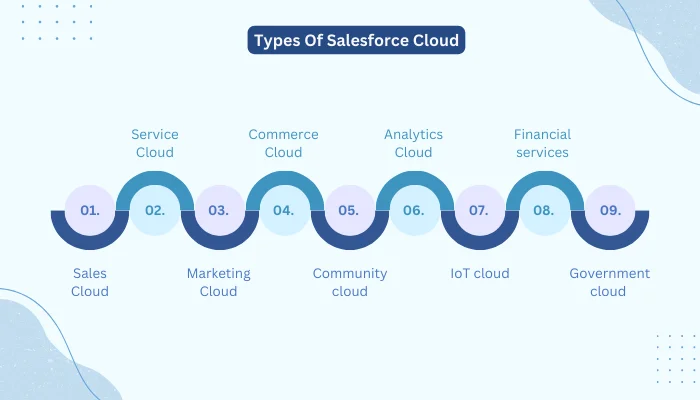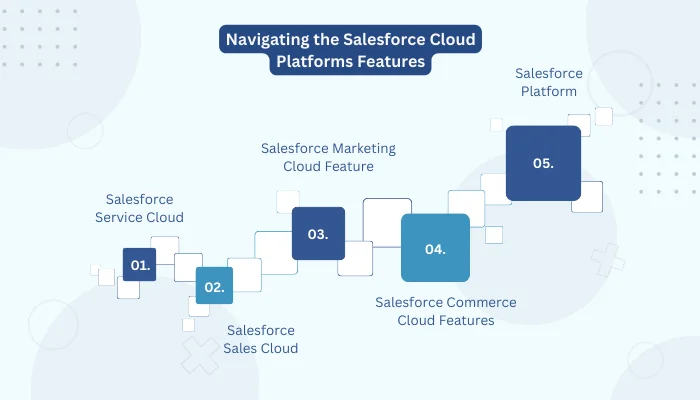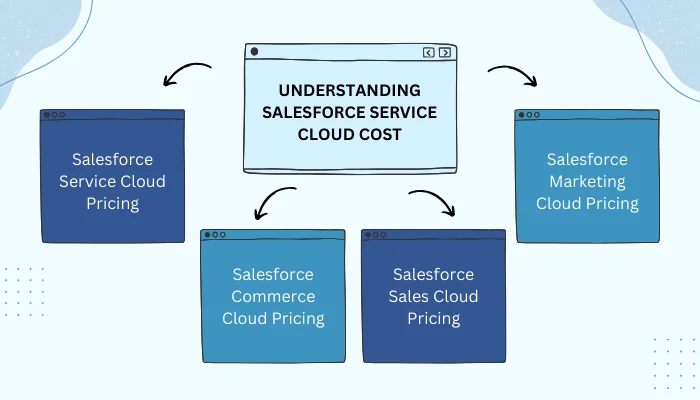In today’s fast-paced digital landscape, businesses are constantly seeking ways to streamline operations, enhance customer experiences, and drive growth. Enter Salesforce Cloud Service, a dynamic solution that empowers businesses to achieve these goals and more.
With a suite of cloud-based tools and capabilities, Salesforce redefines the way organizations connect with customers, manage data, and propel their success.
Moreover, Salesforce Cloud Service isn’t just a single tool-it’s an entire ecosystem of interconnected clouds tailored to various business needs. From Sales Cloud to Service Cloud, Marketing Cloud to Commerce Cloud, and beyond, each cloud offers specialized functionalities that work seamlessly together.
Industry giants across various sectors have harnessed the power of Salesforce Cloud Service to transform their operations. And achieve remarkable business outcomes, these success stories stand as a testament to the platform’s ability to drive growth and innovation.
With this being said, let’s join a vibrant and supportive community of Salesforce users, administrators, developers, and experts. Access knowledge, best practices, and resources that help you maximize the potential of Salesforce Cloud Service.
In this blog, let’s take a look at everything about Salesforce Cloud services and enhance your business performance.
What is Salesforce Cloud Service?
Salesforce Service Cloud is a comprehensive customer service and support platform offered by Salesforce. It’s a leading customer relationship management (CRM) software provider.
Moreover, the service cloud is designed to help businesses deliver exceptional customer experiences by providing tools and functionalities that enable efficiency. Plus, personalized customer service interactions.
Types Of Salesforce Cloud

Salesforce offers a variety of Salesforce Cloud types solutions, each tailored to address specific business needs and objectives.
These clouds provide specialized functionalities and tools to help organizations manage different aspects of their operations. Let’s take a look at them.
Sales Cloud
It transitions from traditional sales methods and streamlines the process by optimizing lead management and facilitating better communication among teams. Furthermore, its analytics empower data-driven decisions.
Service Cloud
Moving beyond conventional customer services, the services cloud fosters a seamless support experience. Consequently, customer satisfaction improves, ultimately leading to brand loyalty. By choosing Salesforce Service Cloud implementation, businesses can streamline their customer service processes, enhance productivity, and ensure consistent, high-quality support across all channels.
Its integrated knowledge base enhances agent productivity.
Marketing Cloud
Shifting towards personalized marketing strategies, the marketing cloud enables targeted campaigns. Moreover, its automation capabilities result in more efficient outreach.
Commerce Cloud
To online selling platforms, Commerce Cloud expands the customer base. Additionally, its unified commerce approach ensures consistency across channels, and built-in AI enhances personalized shopping experiences.
Community cloud
When we move towards enhanced collaboration, the community cloud connects partners, customers, and employees.
Furthermore, its customization options enable tailored experiences and promote self-service, reducing support workload.
Analytics Cloud
Shifting to data-driven decision-making, it transforms raw data into actionable information. Moreover, its interactive dashboards facilitate easy exploration and understanding.
IoT cloud
The IoT cloud enables real-time monitoring and analysis. Consequently, proactive maintenance becomes possible, reducing downtime. And its integration potential enhances overall business processes.
Financial services
Moving towards industry-specific solutions, the financial services cloud caters to the unique needs of financial institutions. It centralizes client information, ensuring compliance. Plus, its automation capabilities streamline complex workflows.
Government cloud
Transitioning to a secure and compliant environment, the Government cloud addresses public sector needs. This ensures data sovereignty and adherence to regulations. Plus, its scalability supports the digital transformation of government services.
Navigating the Salesforce Cloud Platform Features

Salesforce offers a suite of cloud-based solutions tailored to specific business needs, each replete with distinctive features that can greatly enhance operational efficiency. Let’s delve into Salesforce Sales Cloud features, incorporating transition words for a seamless narrative.
Salesforce Service Cloud:
Service Cloud is a robust platform designed to revolutionize customer support and service management. With a focus on enhancing customer experiences, it offers an array of features that empower businesses to excel in their service endeavors.
Transitioning from conventional support models, Service Cloud introduces cutting-edge functionalities.
From intelligent case management, which allows support agents to efficiently track, prioritize, and resolve cases, to its omnichannel routing that ensures customers are seamlessly connected to the right agent, Service Cloud is a game-changer.
Moreover, its integrated knowledge base equips both agents and customers with self-service options, minimizing response times.
The addition of live chat and messaging facilitates real-time interactions, fostering instant issue resolution. Plus, the integration of AI-driven automation through Einstein AI augments agent productivity, while its social media integration extends customer engagement beyond traditional channels.
Salesforce Sales Cloud:
Sales Cloud, another pillar of Salesforce’s suite, is tailored for sales teams aiming to optimize lead management and revenue generation. Its features synergize to drive sales excellence and customer relationship management.
From traditional sales approaches, Sales Cloud introduces features like lead tracking and opportunity management, providing a comprehensive view of the sales pipeline.
Moreover it, seamless integration with marketing efforts ensures a steady flow of leads, and its robust analytics empower data-driven decision-making.
Salesforce Marketing Cloud Feature:
Moving into the realm of personalized marketing strategies, Marketing Cloud comes to the forefront. It empowers businesses to create targeted campaigns and build lasting customer connections through its array of features.
It has generic outreach methods and offers advanced automation capabilities. This streamlines campaign execution, while its real-time tracking and analytics provide insights for continuous refinement.
Furthermore, the integration of AI-driven algorithms enhances personalized customer experiences.
Salesforce Commerce Cloud features:
For businesses venturing into the online selling sphere, Commerce Cloud offers a suite of features that enable seamless e-commerce experiences.
It provides conventional retail practices and leverages unified commerce, ensuring consistency across channels.
Salesforce Platform:
Central to all these clouds is the foundational Salesforce Platform, which underpins the entire ecosystem. Its features provide the flexibility and customization required for businesses to thrive in an ever-evolving digital landscape.
From standalone systems, the Salesforce platform unifies various business processes, offering a single source of truth. Its extensive customization options cater to unique business needs, and its scalability supports growth.
Overall, Salesforce’s suite of clouds provides a comprehensive toolkit for businesses seeking to excel in different aspects of their operations. As you transition between these clouds, you unlock the potential for increased efficiency, enhanced customer experiences, and holistic growth.
Understanding Salesforce Service Cloud Cost

Understanding the cost of implementing Salesforce cloud solutions is pivotal for businesses seeking to make informed decisions about their technology investments.
However, each cloud, including the Salesforce Service Cloud, Salesforce Commerce Cloud, Salesforce Sales Cloud, and Salesforce Marketing Cloud, comes with distinct pricing models and considerations.
Let’s delve into the pricing aspects of these clouds, incorporating transition words to facilitate a smooth flow of information.
Salesforce Service Cloud Pricing:
When it comes to Salesforce Service Cloud pricing, businesses have various options to align with their budget and requirements. It supports systems,and Service Cloud introduces flexibility in its pricing plans.
It all depends on the scale and complexity of your customer service needs; there are tiered plans designed to accommodate businesses of all sizes.
Also, pricing structures might include subscription-based models or tiered pricing based on the number of users, features, and support levels required.
Salesforce Commerce Cloud Pricing:
The e-commerce platform, Salesforce Commerce Cloud, offers pricing plans that cater to the specific needs of businesses engaging in online selling. The pricing structure of Commerce Cloud may involve a combination of factors, including:
- the number of storefronts
- Products
- Integrations
As businesses shift from traditional retail to online commerce, they offer scalable pricing options that align with growth trajectories.
Salesforce Sales Cloud Pricing:
Shifting the focus to revenue generation, its pricing models are designed to accommodate the diverse requirements of sales teams.
Transitioning from conventional sales approaches, Sales Cloud offers different tiers based on the size of your sales team and the scope of features needed.
However, pricing may be structured per user, offering a range of functionalities that empower lead management, opportunity tracking, and analytics-driven decision-making.
Salesforce Marketing Cloud Pricing:
The personalized marketing strategies with Salesforce Marketing Cloud introduce a range of pricing considerations.
Marketing Cloud pricing models often take into account factors such as the number of contacts, the volume of emails, and the complexity of automation.
As businesses move beyond generic outreach, Marketing Cloud offers tiered plans that encompass the tools and features necessary for targeted campaigns and customer engagement.
Overall, understanding Salesforce Cloud pricing is integral to making informed decisions about technology adoption. As businesses transition to these clouds, each with its unique focus and benefits, aligning the pricing structure with the organization’s needs. That ensures a strategic investment in growth, enhanced customer experiences, and operational excellence.
Conclusion
Whether you’re a small start-up seeking to establish a solid support foundation and enhance your existing customer service. Salesforce Service Cloud offers a versatile and scalable solution. It’s not just a cloud platform; it’s a catalyst for positive change and progress.
In a world where customer expectations are evolving rapidly, embracing Salesforce Service Cloud isn’t just a choice; it’s a strategic investment in the future. It’s a way to empower your teams, satisfy your customers, and ultimately propel your business towards continued success.
So, dive into a new era of customer service with Salesforce Service Cloud and unlock a world of possibilities for your business.

Niketan Sharma, CTO, Nimble AppGenie, is a tech enthusiast with more than a decade of experience in delivering high-value solutions that allow a brand to penetrate the market easily. With a strong hold on mobile app development, he is actively working to help businesses identify the potential of digital transformation by sharing insightful statistics, guides & blogs.
Table of Contents




No Comments
Comments are closed.